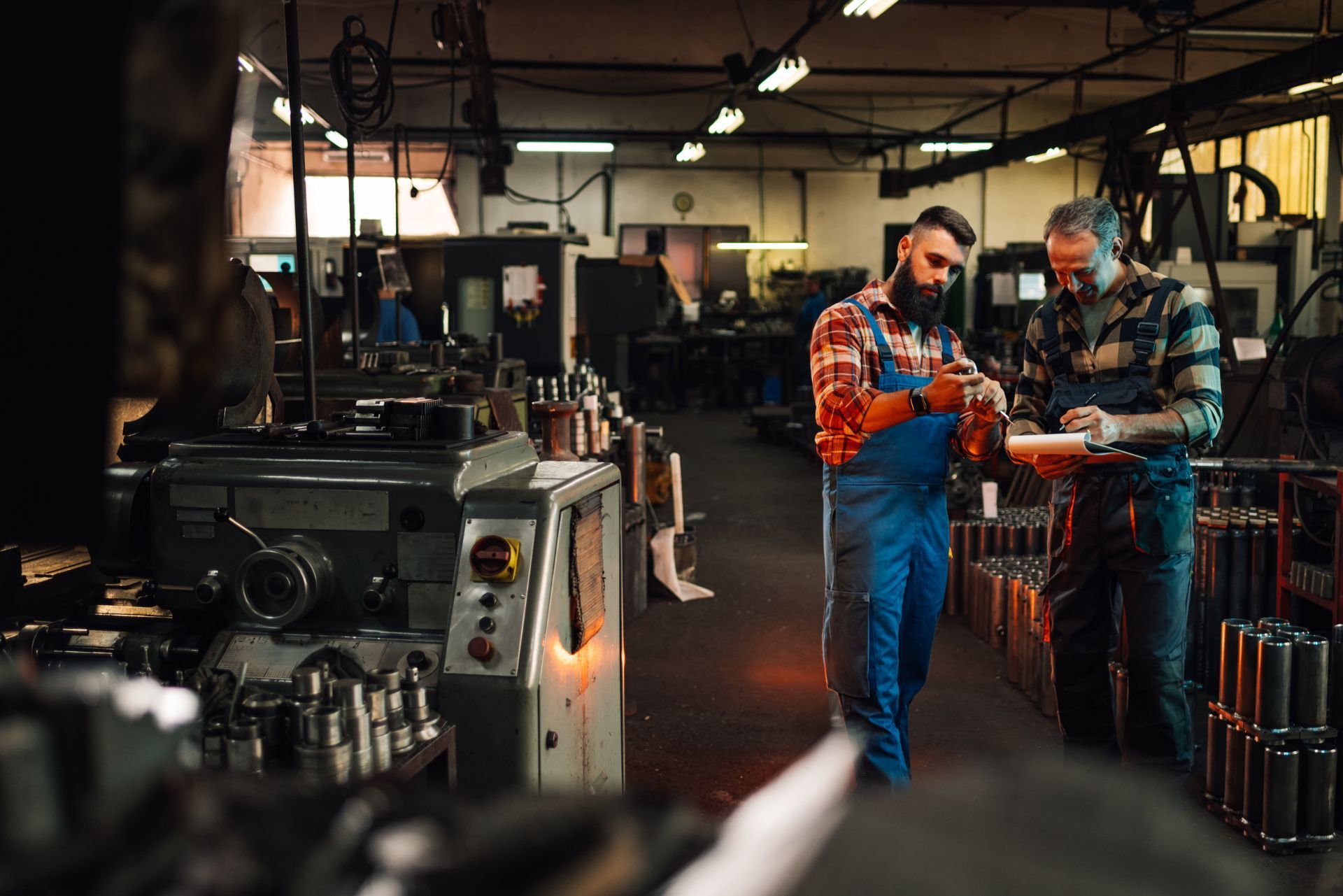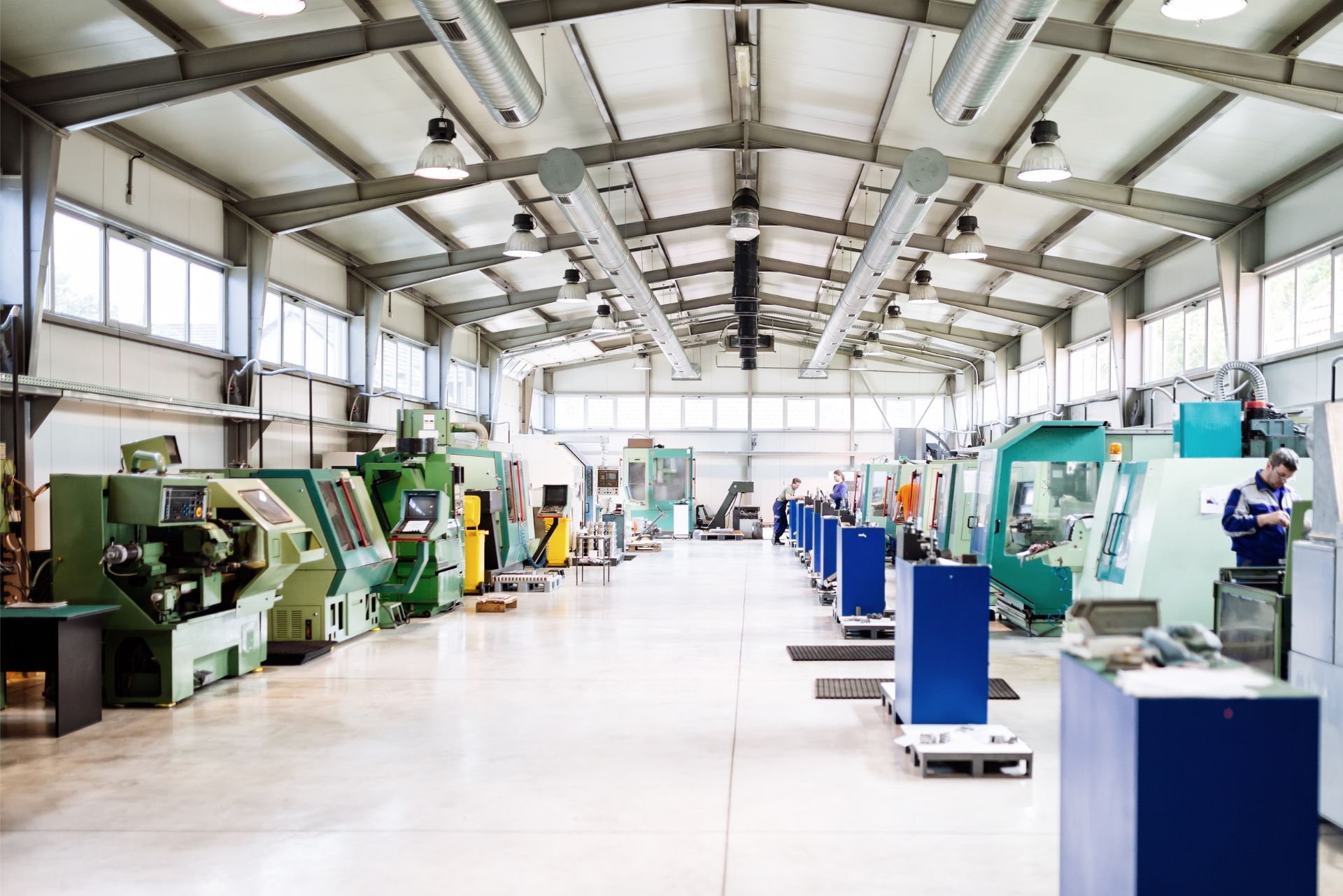Top 3 Recommended Policies

By: Lance Hale
Licensed Commercial Insurance Specialist
425-320-4280
Precision machining is the backbone of many industries across Washington, from aerospace in Everett to maritime repair in Tacoma. With lathes spinning thousands of revolutions per minute and high-tech CNC equipment carving intricate parts, the work is both valuable and inherently risky. A single spark, a faulty spindle, or a dropped casting can disrupt production lines worth millions. That is why a tailored insurance program is not just paperwork for machine shop owners; it is a financial safety net that keeps jobs, contracts, and reputations intact.
Why Machine Shops in Washington Need Specialized Insurance
A standard business owner’s policy is seldom enough for a modern machine shop. Shops often store costly raw materials such as titanium billets, maintain specialized cutting fluids that can contaminate groundwater, and ship finished parts worldwide under strict delivery windows. In Washington, where manufacturing accounts for roughly 11% of the state’s GDP, an uninsured incident can ripple through local supply chains and halt work in sectors from medical devices to agriculture.
The unique combination of heavy machinery, skilled labor, and tight tolerances means that the potential loss severity is higher than in many other trades. A single CNC machining center can cost $250,000 or more, and an unscheduled outage may trigger late-delivery penalties from contract partners like Boeing or PACCAR. Specialized coverage keeps these financial shockwaves contained, letting owners focus on meeting ISO 9001 or AS9100 quality standards rather than scrambling for emergency funds.
Finally, Washington workplaces operate under some of the most stringent safety and environmental regulations on the West Coast. Even a minor chemical spill can trigger Department of Ecology investigations that result in five-figure fines. The right policy pays for cleanup, legal defense, and third-party claims so that a single incident does not jeopardize long-term business viability.
Unique Risk Landscape
Machine shops face a cocktail of risks seldom found in other fields. High-speed tools generate metal shavings that can ignite combustible dust, while hydraulic fluid leaks pose slip hazards and fire hazards simultaneously. Ergonomic strains from repetitive finishing work raise the odds of workplace injury. These exposures require a policy that blends property, liability, and health-and-safety coverage into a single, well-coordinated package.
Moreover, the integration of advanced technologies such as robotics and automation in machine shops introduces new dimensions of risk. While these innovations can enhance productivity and precision, they also require a reevaluation of existing insurance policies. For instance, if a robotic arm malfunctions and causes damage to both the machine and the operator, the financial repercussions can be significant. Specialized insurance can address these complexities by covering equipment breakdowns, cyber risks associated with automated systems, and even liability for injuries caused by robotic operations.
Regulatory Environment
Washington’s Labor & Industries (L&I) department enforces worker safety rules more aggressively than many states. Fines for unguarded machinery start at $7,000 per offense, and repeat violations can run well into six figures. In addition, the state’s pollution control laws mandate immediate reporting and remediation of coolant leaks or solvent spills. Insurers that understand these regulations often provide loss-control consultations to help shops stay compliant and minimize premium spikes.
Furthermore, the evolving landscape of environmental regulations means that machine shops must remain vigilant about compliance. With the state pushing for greener manufacturing practices, shops may face additional scrutiny regarding their waste management and emissions. Specialized insurance can not only cover the costs associated with compliance but also provide resources for implementing sustainable practices. This proactive approach not only mitigates risks but can also enhance a shop's reputation, making it more attractive to environmentally conscious clients and partners.
Core Policies Every Washington Machine Shop Should Consider
The following coverages form the foundation of a sound insurance strategy. While exact needs vary by shop size and specialization, most carriers bundle these policies for cost savings and simplified administration.
General Liability
This policy handles bodily injury and property damage claims from third parties. If a customer slips on coolant while touring the shop or an errant metal chip damages a visiting vendor’s laptop, general liability pays medical bills, repairs, and legal fees. Washington courts awarded an average of $52,000 in premises liability judgments last year, which far outstrips the cost of carrying a $1 million occurrence limit. Additionally, it’s essential for machine shops to maintain a safe working environment, as a proactive approach to safety can significantly reduce the likelihood of accidents and claims. Regular training sessions and safety audits can not only enhance employee awareness but also demonstrate to insurers that the shop prioritizes risk management.
Commercial Property
Commercial property insurance covers the building, machinery, and even finished inventory stored onsite. Whether the structure is a century-old brick warehouse in Spokane or a new tilt-up concrete plant in Kent, property coverage reimburses repair or replacement after fires, windstorms, vandalism, or theft. Many insurers offer “equipment customization” endorsements tailored to CNC, EDM, and laser-cutting gear that insure full replacement value without depreciation. Furthermore, shops should consider adding business interruption coverage, which can help mitigate the financial impact of unforeseen events that disrupt operations, allowing for continued cash flow during repairs or rebuilding.
Workers’ Compensation
Washington is a monopolistic state for workers’ compensation, meaning employers must purchase coverage directly from L&I or qualify as self-insured. Rates vary by job classification; a journeyman machinist currently carries a base rate of roughly $2.92 per hour worked. Even with this government-run system, private stop-gap liability policies are advisable to cover employer negligence claims that fall outside L&I’s exclusive remedy provisions. It’s also beneficial for machine shops to implement comprehensive safety programs that not only comply with state regulations but also foster a culture of safety among employees. By investing in safety training and ergonomic assessments, shops can reduce workplace injuries, which can lead to lower insurance premiums over time.
Commercial Auto
Many shops operate box trucks or flatbeds to deliver parts to customers around Puget Sound. Commercial auto insurance covers bodily injury, property damage, and cargo losses arising from vehicle accidents. Because winter driving conditions on Snoqualmie Pass can turn treacherous, higher liability limits—often $2 million or more—are common among shops with interstate routes. Additionally, shops should consider including coverage for hired and non-owned vehicles, especially if employees use their personal vehicles for business purposes. This can protect the shop from liability in case of an accident involving an employee’s vehicle while performing work-related tasks.
Equipment Breakdown
Often called “boiler and machinery” coverage, equipment breakdown pays for sudden mechanical or electrical failure of critical machines. If a voltage spike fries the servo motors on a five-axis CNC mill, the policy reimburses repairs and, optionally, lost income during downtime. In Washington, where hydropower variability can cause brief power outages, this coverage is particularly relevant. Machine shops should also maintain regular maintenance schedules for their equipment, as this not only prolongs the life of the machines but can also be a factor in reducing insurance premiums. Documenting maintenance activities can demonstrate to insurers that the shop is committed to minimizing risks associated with equipment failure.
Product Liability
A defective aerospace component can trigger recalls, grounding of aircraft, and multi-party lawsuits. Product liability insurance defends the shop and covers settlements if a part produced under its quality control fails in service. Given that Washington supplies roughly 90% of the nation’s large commercial aircraft, the aerospace supply chain expects shops to carry at least $5 million in aggregate product liability limits. Additionally, implementing robust quality control processes can help mitigate risks associated with product liability claims. Regular audits and compliance with industry standards not only protect the shop but also enhance its reputation among clients and partners.
Cyber Liability
Industry 4.0 technology connects machines to cloud-based scheduling, making cybersecurity a real concern. A ransomware attack that corrupts CAD files can halt production for days. Cyber liability pays for data restoration, extortion demands, and notification costs. The FBI’s Seattle field office reported a 34% jump in industrial cyber incidents last year, making this coverage no longer optional for shops that rely on networked controls. To further safeguard against cyber threats, machine shops should invest in employee training on recognizing phishing attempts and implementing strong password policies. Regularly updating software and conducting vulnerability assessments can also bolster the shop's defenses against potential cyberattacks.

Optional but Valuable Add-Ons
While the core policies address the most common losses, certain endorsements and optional coverages tackle gaps that could otherwise erode profits. Selecting the right mix often depends on contract requirements and the shop’s growth trajectory.
Because optional endorsements typically cost pennies on the dollar compared to primary policies, they deliver a high return on investment if a low-frequency, high-severity event hits the balance sheet.
Business Interruption
When a fire or tornado shuts down production, business interruption insurance replaces lost income and ongoing expenses such as payroll and loan payments. A 2022 study by the Washington Manufacturing Council found that the average mid-sized shop burned through cash reserves in just 23 days of downtime, making this endorsement a lifeline that keeps staff employed and customers loyal.
Inland Marine
Despite the nautical name, inland marine covers mobile equipment, tools, and goods in transit. If a custom gearbox is damaged during courier delivery from Yakima to Redmond, inland marine pays to remake the part and expedite shipping so the customer’s assembly line stays on schedule.
Employment Practices Liability Insurance (EPLI)
Washington’s progressive labor laws invite more wage-and-hour and discrimination claims than many states. EPLI protects against allegations of wrongful termination, harassment, or failure to accommodate disabilities. Settlements can exceed $150,000 even before legal fees, making EPLI a prudent add-on for shops with growing workforces or high turnover.
Commercial Umbrella Liability
Umbrella policies sit atop underlying general, auto, and employer liability coverages, providing extra limits in million-dollar increments. A catastrophic injury or multi-vehicle crash can exhaust primary policies quickly; an umbrella ensures the shop’s assets and owner’s personal equity remain insulated from courtroom verdicts.
Estimating the Cost of Coverage
Premiums vary widely based on revenue, payroll, location, and claims history. A small, 5-employee prototype shop in Bellingham might spend $12,000 annually for a package that includes $1 million general liability, property coverage on $600,000 of equipment, and basic cyber limits. In contrast, a 50-employee defense contractor in Renton could pay $200,000 a year once high product liability, workers’ compensation, and umbrella limits are factored in.
Independent benchmarking from the Insurance Information Institute shows that Washington manufacturers pay about 9% less for property coverage than the national average thanks to modern building codes and ready access to fire services. However, workers’ compensation costs land roughly 14% higher because of the state-run system’s benefit richness. When budgeting, shop owners should view insurance as 1–4% of annual gross revenue, adjusting upward for aerospace or medical part certification requirements.
Factors That Influence Pricing
Underwriters examine the shop’s safety track record, the age and maintenance schedule of equipment, and the complexity of finished parts. A robust lock-out/tag-out program or an industry-recognized safety certification can trigger premium credits up to 15%. Conversely, prior OSHA violations or open workers’ comp claims can lead to surcharges or deductible hikes.
Claims Examples from Washington Shops
Example one: A Spokane shop experienced a quench tank flash fire that scorched $180,000 worth of heat-treating equipment. Property and business interruption insurance combined to cover repairs and three weeks of lost income. Without the latter, the company would have struggled to keep machinists on payroll.
Example two: A subcontractor hauling mill fixtures from Vancouver, Washington, to a Portland plant skidded on black ice and overturned. Inland marine paid $42,000 to remake damaged fixtures, while commercial auto covered cleanup and towing. Because the shipment was time-sensitive, the policy also reimbursed overnight freight charges for the replacement batch.
Example three: A Seattle aerospace supplier faced a lawsuit when a helicopter component allegedly failed, grounding an entire fleet. Product liability insurance retained specialized counsel and negotiated a confidential settlement, protecting both the shop’s finances and its valuable supplier approval status.
How to Lower Premiums Without Sacrificing Protection
Investing in safety technology yields measurable dividends. Thermal sensors on spindle motors can prevent fires, while mist-collection systems reduce respiratory hazards and cut workers’ comp claims. Many carriers offer premium credits for machine guarding audits, documented preventive maintenance, and formal lock-out/tag-out training.
Another strategy involves raising deductibles on well-controlled risks like minor tool breakage while keeping lower deductibles on catastrophic exposures such as product liability. Bundling multiple coverages with a single insurer often unlocks multi-policy discounts and streamlines annual renewals.
Choosing the Right Broker or Agent
Look for brokers who specialize in manufacturing or have in-house loss-control engineers familiar with CNC, EDM, and additive processes. These professionals can translate technical jargon into underwriting language, ensuring the shop’s risk profile is presented accurately and competitively. They also stay current on regulatory shifts, such as potential changes to Washington’s pollution liability requirements.
Interview at least two brokers and request sample policy comparisons that highlight exclusions, sub-limits, and available endorsements. A reputable broker should proactively schedule site visits, review incident logs, and suggest risk-management improvements before quoting, not afterward.

Frequently Asked Questions
Is insurance mandatory for machine shops in Washington?
Workers’ compensation is mandatory under state law, and commercial auto is required for any titled vehicles. Other coverages are not legally mandated but are often required by customers, lenders, or industrial landlords.
How often should policies be reviewed?
An annual review is standard, but any major equipment purchase, facility upgrade, or new contract with unique insurance clauses warrants an immediate policy check-up to avoid uncovered gaps.
Can a start-up shop get coverage without claims history?
Yes. Insurers evaluate the owner’s industry experience, safety plans, and projected revenue. Premiums may be higher the first year, but a clean loss run quickly lowers costs in subsequent renewals.
Does ISO certification reduce premiums?
Many insurers offer modest discounts, typically 5–10%, for ISO 9001 or AS9100 certified facilities because documented processes correlate with lower claim frequency and severity.
What documentation is needed for a claim?
Keep time-stamped photos, maintenance logs, police or fire reports, and invoices for repairs or replacement parts. Prompt, complete documentation speeds settlements and limits business disruption.
Key Takeaways
Machine shops across Washington operate in a high-stakes environment where precision and productivity meet ever-present physical, legal, and cyber risks. A comprehensive insurance program—built on core policies, reinforced with strategic endorsements, and fine-tuned through proactive risk management—protects cash flow and competitive standing.
By partnering with an industry-savvy broker, investing in safety improvements, and routinely reviewing coverage as operations evolve, shop owners can turn insurance from a reluctant expense into a strategic asset that underwrites long-term growth and resilience.

